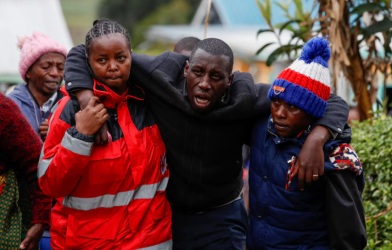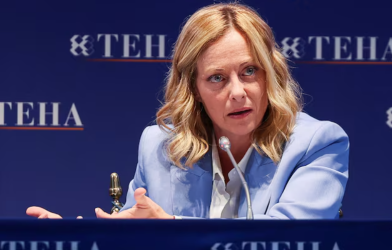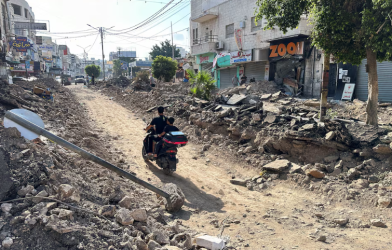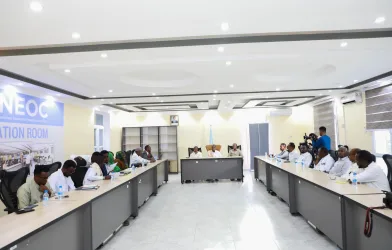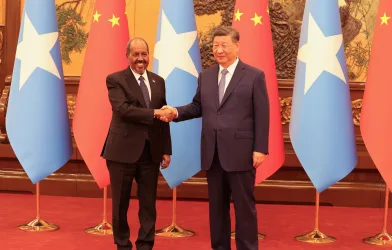 US Secretary of State Hillary Clinton has said the death of top African al-Qaeda militant Fazul Abdullah Mohammed is a “significant blow” to the group.
US Secretary of State Hillary Clinton has said the death of top African al-Qaeda militant Fazul Abdullah Mohammed is a “significant blow” to the group.
He and another militant were killed earlier this week in a shootout with police at a checkpoint in Somalia’s capital, Mogadishu, officials said.
Mr Mohammed was the most wanted man in Africa, with a $5m bounty on his head.
He was suspected having played a key role in the 1998 US embassy bombings in East Africa, which killed 224 people.
He was also accused of attacking Israeli targets on the Kenyan coast in 2002, and was recently believed to have been working with the Islamist militant group, al-Shabab, which controls much of southern Somalia.
‘Victory for the world’
Mr Mohammed was shot dead by Somali Transitional Federal Government (TFG) forces in north-western Mogadishu overnight on Tuesday, Somali security officials said.
“Our forces fired on two men who refused to stop at a roadblock. They tried to defend themselves when they were surrounded by our men,” TFG commander Abdikarim Yusuf told the AFP news agency.
“We took their ID documents, one of which was a foreign passport,” he said, adding that medicine, mobile phones and laptops were also found.
Somali sources told AFP that Mr Mohammed was carrying $40,000 in cash and a South African passport bearing the name Daniel Robinson.
Gen Abdikarim Yusuf Dhagabadan, Somalia’s army chief, said officials at first did not know who the dead man was.
“We buried him,” he told the Associated Press. “But soon after checking his documents, [we] exhumed his body and took his pictures and DNA. Then we learned that he was the man wanted by the US authorities.”
The general described the death as “similar to Osama bin Laden’s”, who was killed in a US commando raid on his home in northern Pakistan on 2 May.
“It is a victory for the world. It is a victory for Somali army,” he added.
A senior US government official also told the BBC that it was a “very big deal” and commended the actions of the Transitional Federal Government.
“Fazul Abdullah Mohammed’s death removes one of the terrorist group’s most experienced operational planners in East Africa and has almost certainly set back operations,” the official said.
After landing in Tanzania’s capital, Dar es Salaam, on the second leg of a tour of Africa, Mrs Clinton told reporters: “[His] death is a significant blow to al-Qaeda, its extremist allies, and its operations in East Africa.”
“It is a just end for a terrorist who brought so much death and pain to so many innocents in Nairobi and Dar es Salaam and elsewhere – Tanzanians, Kenyans, Somalis, and our own embassy personnel.”
Born in the Comoros islands in the early 1970s, Mr Mohammed is believed to have joined al-Qaeda in Afghanistan during the 1990s.
After the bombings of the US embassies in the Kenyan capital, Nairobi, and Dar es Salaam in 1998, the US authorities accused him of involvement and offered the $5m reward for information leading to his capture.
In 2002, Mr Mohammed was reported to have been put in charge of al-Qaeda operations in East Africa.
That year, he was blamed for the bombing of an Israeli-owned hotel at the beach resort of Kikambala, Kenya, which left 13 people dead, and an attempt to shoot down an Israeli passenger aircraft in nearby Mombasa.
In 2007, he survived a US air strike on the southern Somali coastal village of Hayo, near the town of Ras Kamboni.
In recent years, Mr Mohammed is thought to have joined other foreign militants in Somalia fighting fought alongside al-Shabab, which declared allegiance to al-Qaeda in 2010. It said reports of his death were untrue.
Were you affected by the 1998 US embassy bombings in Kenya and Tanzania? What is your reaction to Fazul Abdullah Mohammed’s death? Send us your comments and experiences.
Source: BBC
Fazul Abdullah Mohammed: Death is 'blow' for al-Qaeda
Published: June 11, 2011


